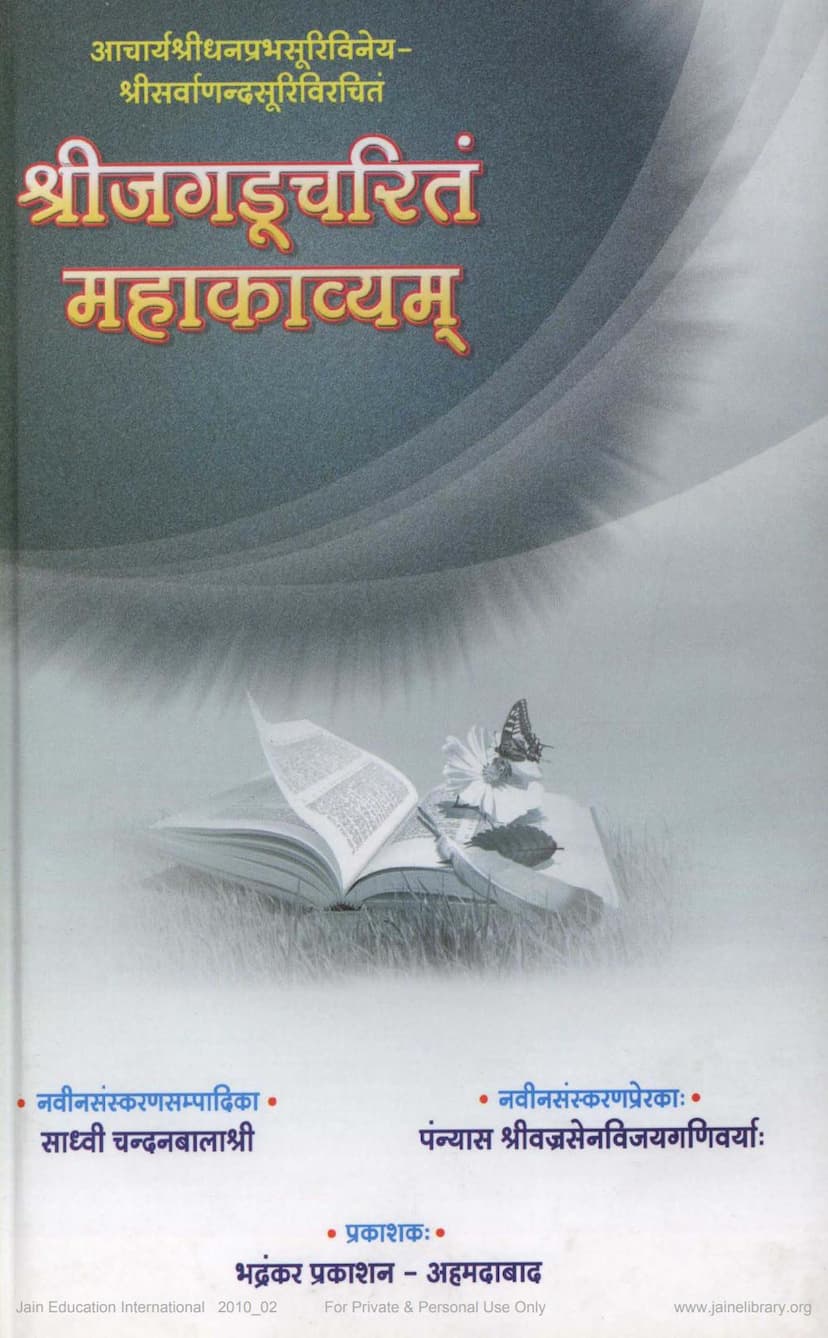Jagducharitam Mahakavyam
Added to library: September 1, 2025

Summary
Here's a comprehensive summary of the Jain text "Jagducharitam Mahakavyam," based on the provided pages:
Book Title: Jagducharitam Mahakavyam (The Great Epic of Jagdu's Life) Author: Acharya Shri Sarvanandsuri (disciple of Acharya Shri Dhanprabhsurivarya) Editor of New Edition: Sadhvi Chandanbalashreeji Inspiration for New Edition: Panyas Shri Vajrasenvijayganivarya Publisher: Bhadraṇkar Prakashan, Ahmedabad Year of Publication (New Edition): 2010 (Veer Samvat 2535 / Vikram Samvat 2065)
Overview:
"Jagducharitam Mahakavyam" is a significant Jain epic poem composed in the 14th century. It chronicles the life and exemplary deeds of Jagadushaha (Jagadushah), a prominent Jain merchant and philanthropist from the Shri Mali Vanik community. The epic is renowned for its detailed narrative, poetic excellence, and the historical insights it provides.
Key Themes and Content:
The epic is structured into seven sargas (cantos) and contains 388 verses. It highlights several key aspects of Jagadushaha's life:
-
Genealogy and Ancestry: The initial sargas delve into Jagadushaha's lineage, tracing his ancestry through notable figures like Viyaduh, Varnag, Vas, and Sol. This section establishes the noble background from which Jagadushaha emerged.
-
Patronage and Virtues: The poem elaborates on the virtuous qualities and philanthropic activities of Jagadushaha's ancestors, emphasizing their contributions to society and the Jain faith.
-
Jagadushaha's Life and Character:
- Philanthropy and Charity: The most prominent theme is Jagadushaha's extraordinary generosity, particularly his role during a severe famine in Gujarat from 1271 to 1274 CE (Vikram Samvat 1312-1315). He is credited with opening numerous donation centers across India, distributing vast quantities of grain, and thereby saving countless lives from starvation.
- Business Acumen and Integrity: Jagadushaha was a highly successful merchant, trading extensively even to regions like Aden. The epic showcases his business acumen and his commitment to ethical practices.
- Devotion to Jainism: He was deeply devoted to Jainism, undertaking pilgrimages to holy sites like Shatrunjaya and Girnar, commissioning Jain temples, and renovating old ones.
- Interfaith Harmony: Notably, Jagadushaha demonstrated remarkable tolerance and respect for other religions. He undertook the renovation of temples dedicated to Shiva and Vishnu and also contributed to the construction of mosques for Muslims.
- Family Life: The epic touches upon his family life, including his wives and children, and significant events like the granting of a boon by the sea deity (Varuna) for offspring, and the subsequent events.
- Encounter with the Sea Deity: A detailed account is given of Jagadushaha's devotion to the sea deity, his request for prosperity and progeny, and the boon he received.
-
Historical Context: The poem provides valuable historical information about the period, including:
- The severe famine in Gujarat from VS 1312-1315.
- The rulers of various regions at that time: Vishaldev in Gujarat, Madanvarma in Malwa, Mu'izz al-Din in Delhi, and Pratap Singh in Kashi.
- The maritime trade of Gujarat and the influence of Gujarati ships in overseas trade.
- The political landscape and interactions between rulers like Lavan Prasad of Gujarat and Pithadev of the region of Par.
-
Confrontation with Pithadev: A significant part of the epic narrates Jagadushaha's confrontation with Pithadev, the ruler of Par. When Pithadev attempted to assert his dominance and threatened Jagadushaha, Jagadushaha cleverly responded by constructing a fortress with a stone representation of a donkey with two horns, symbolizing the impossibility of Pithadev's threats. This act demonstrated Jagadushaha's intelligence and courage in defending his honor and his construction project.
-
Spiritual and Ethical Teachings: The epic is interspersed with profound philosophical and ethical teachings, emphasizing the transient nature of worldly possessions, the importance of virtuous conduct, the pursuit of liberation, and the glorification of dharma.
-
Poetic Merit: Acharya Sarvanandsuri employed a rich variety of meters and poetic devices, making the work a significant contribution to Sanskrit literature and a valuable resource for students of prosody. The epic is celebrated for its eloquent descriptions and evocative imagery.
Significance of the New Edition:
This new edition, published by Bhadraṇkar Prakashan, aims to make this important historical and literary work accessible to a wider audience. It builds upon previous publications, purifying the text and including a Gujarati translation based on the work of M.D. Khakhar. The publication is a testament to the efforts of Sadhvi Chandanbalashreeji in editing and Panyas Shri Vajrasenvijayganivarya in inspiring this new rendition.
Overall:
"Jagducharitam Mahakavyam" is more than just a biography; it's a tribute to the ideals of dharma, selfless service, and exemplary leadership embodied by Jagadushaha. The epic serves as an inspiration, showcasing how one individual, through immense wealth, unwavering faith, and boundless compassion, can profoundly impact society and leave an indelible mark on history.